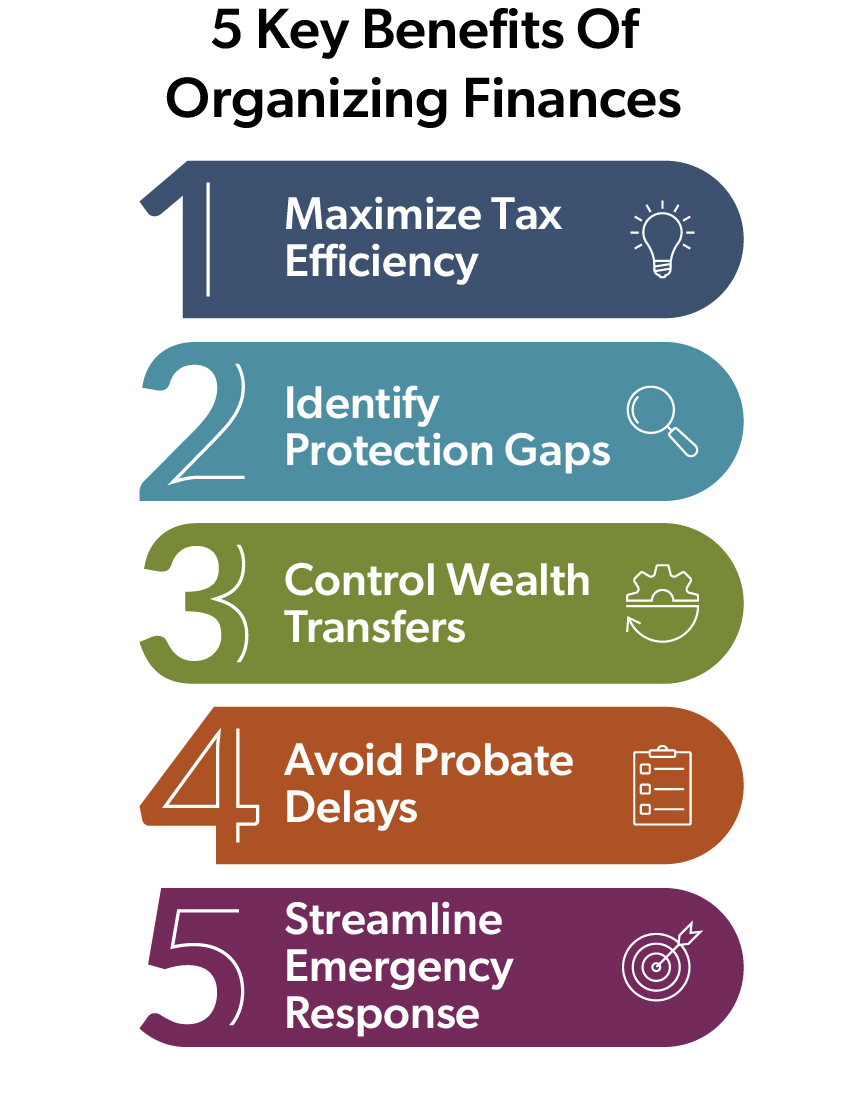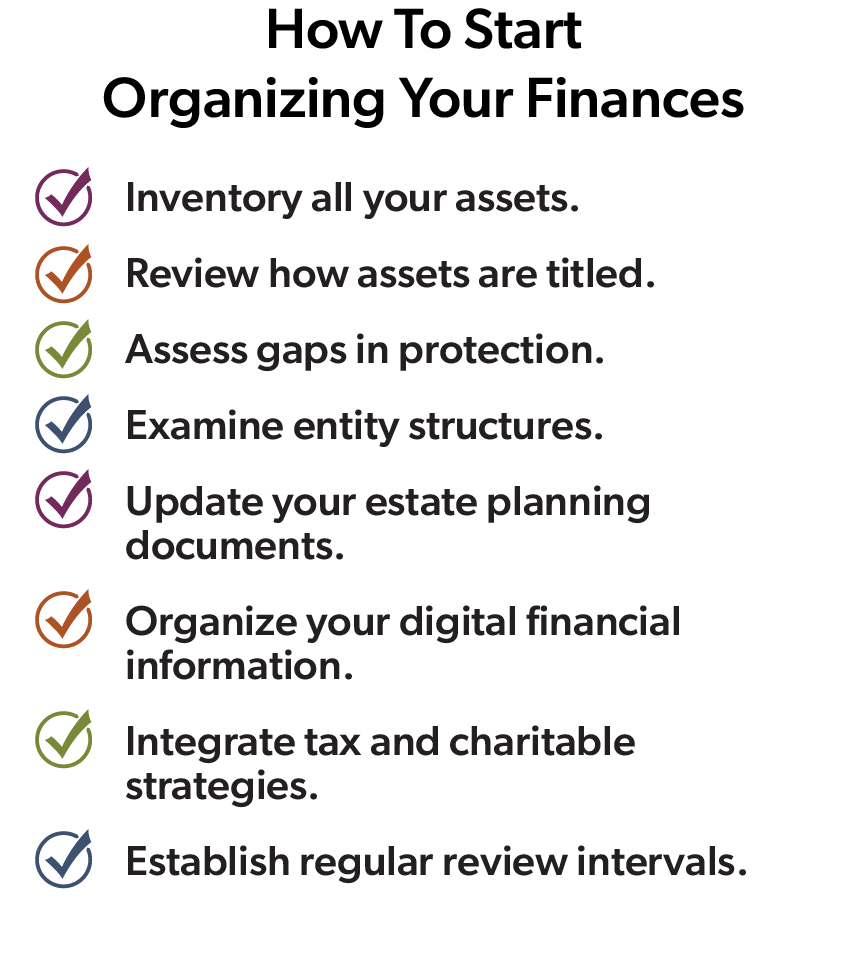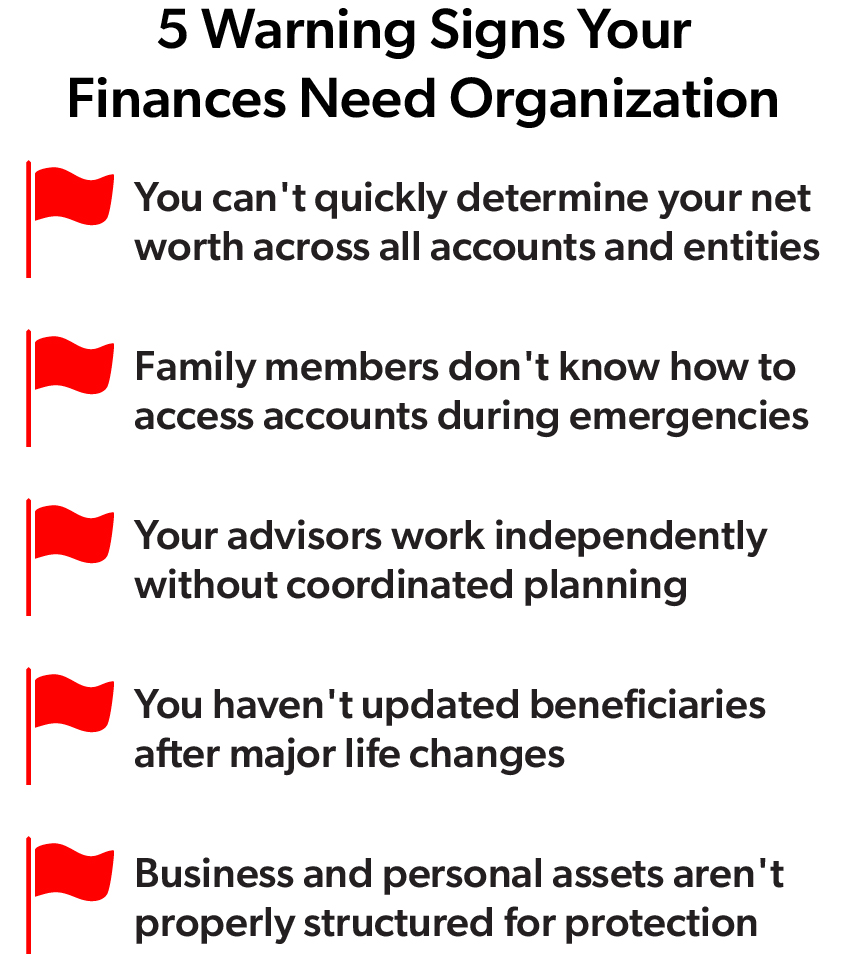Managing complex financial portfolios becomes challenging when wealth spans multiple accounts, various entities, business ownership, and different advisors. Financial organization becomes a priority as your wealth grows. Without clear organization and a unified approach, even successful entrepreneurs and investors can lose track of their complete financial picture.
When you don't know how to organize finances effectively, you risk missing opportunities, duplicating efforts, and making decisions without complete information. More importantly, disorganized finances can create significant problems during emergencies, business transitions, or when planning for the next generation.
With the right approach and expert guidance, you’ll end up with a system that works for your unique situation, whether you're managing a single business or coordinating multiple entities, trusts, and investment accounts.
Why Should You Organize Your Finances?
Organizing your finances has widespread benefits across multiple areas of your life, covering more than just the numbers. Not least among the benefits is the peace of mind you’ll get from creating a clear view, with up-to-date wealth forecasts, of your estate. Other advantages become apparent when you manage wealth across multiple entities, plan significant life or wealth transitions, or when your family experiences a loss. Here are some of the top benefits our wealth advisors often see with clients who have complex finances.
 Maximizing tax efficiency. Coordinated planning across all your holdings can reduce your tax burden while still maintaining your charitable and/or legacy goals. When your CPA, estate planning attorney, and wealth advisor work from the same organized set of information, they can identify opportunities that fragmented data and planning can miss.
Maximizing tax efficiency. Coordinated planning across all your holdings can reduce your tax burden while still maintaining your charitable and/or legacy goals. When your CPA, estate planning attorney, and wealth advisor work from the same organized set of information, they can identify opportunities that fragmented data and planning can miss.
Identify protection gaps. Financial organization reveals vulnerabilities that could threaten your nest egg. Underinsured assets or poorly structured ownership can expose both personal and business wealth to unexpected liabilities. Many successful business owners discover they have coverage gaps only after reviewing their complete financial picture.
Control wealth transfers. Without proper planning and appropriate asset titling, your carefully built portfolio might not reach intended beneficiaries. Worse, it could face unnecessary taxes that organized planning would have avoided. State intestacy laws rarely align with what individuals actually want for their families and companies.
Avoiding probate delays. Business partnerships and personal assets often get tangled in probate court proceedings when ownership interests aren't clearly documented or properly structured. Probate can take anywhere from several months to multiple years, during which time assets remain frozen and inaccessible to beneficiaries. Business operations can suffer as a result.
Streamline emergency response. Your loved ones need clear guidance on what to do, who to call, and what responsibilities they may inherit. Organized finances include accessible instructions and contact information for all advisors, making difficult times less stressful for the people you love.
How To Start Organizing Your Finances
Working with an expert and breaking this into manageable steps makes the process approachable. Here are steps our wealth advisors often customize for clients’ needs.
 Step 1: Inventory all your assets. Start by creating a comprehensive map of your complete financial situation. Consider starting with a simple spreadsheet and working with an advisor to ensure you document everything accurately. Your list will include obvious holdings like real estate and investment accounts, but don't skip business investments, intellectual property, collectibles, or other valuable assets. Document the current value of the assets and, where possible, growth projections for each category.
Step 1: Inventory all your assets. Start by creating a comprehensive map of your complete financial situation. Consider starting with a simple spreadsheet and working with an advisor to ensure you document everything accurately. Your list will include obvious holdings like real estate and investment accounts, but don't skip business investments, intellectual property, collectibles, or other valuable assets. Document the current value of the assets and, where possible, growth projections for each category.
Step 2: Review how assets are titled. Asset titling determines how your wealth transfers and whether it gets caught in probate. A wealth advisor can help you examine each asset to identify potential risks and ownership issues. Some assets work best titled in individual names, others benefit from joint ownership, and some should be held in trusts or business entities for optimal protection and tax efficiency. This step often reveals opportunities to restructure ownership for better outcomes.
Step 3: Assess gaps in protection. Insurance often gets more complex as your wealth increases across multiple categories. Evaluate your life, disability, and umbrella coverage, plus any specialized insurance for assets like art, collectibles, boats, or other high-value equipment. Analyze liability exposure from both business activities and personal holdings. Business owners often need different coverage levels than employees, and your insurance needs may have evolved as your wealth has grown.
Step 4: Examine entity structures. Review your LLC structures and business ownership arrangements for tax efficiency, succession planning, and liability protection. Entity structures that worked when you started your business may not serve your current needs. Consider whether your current setup optimizes tax treatment, provides adequate asset protection, and supports your long-term succession or exit strategies. Changes in tax law or family circumstances might make restructuring beneficial.
Step 5: Update your estate planning documents. As life changes, so should estate plans to reflect current wishes, family situations, and asset values. Review trustees, beneficiaries, and succession plans to ensure they align with your current goals. Coordinate estate planning with business succession strategies and charitable giving objectives. Read more about estate planning at every life stage.
Step 6: Organize your digital financial information. Secure storage and access to important documents, passwords, and digital assets becomes increasingly important as your financial life grows more complex. Create a system for storing estate planning documents, insurance policies, account information, and important contacts in a way that's both secure and accessible to authorized family members or advisors when needed. Read our article “The Legacy of Your Digital Assets” for more on this topic.
Step 7: Integrate tax and charitable strategies. Coordinate investment timing, business transactions, and charitable giving to optimize tax efficiency while supporting causes you care about. This might involve timing asset sales, structuring business transactions, or using charitable vehicles like donor-advised funds. Look for opportunities where charitable giving can provide tax benefits while advancing your legacy goals. Learn about how charitable trusts work for business assets in our article.
Step 8: Establish regular review intervals. Plan to review and update your financial organization at least annually, or when significant changes occur. Review triggers include business transactions, family changes, market shifts, tax law changes, or retirement planning. Your wealth advisor can coordinate these reviews to ensure all areas of your financial life remain aligned with your goals and circumstances.
Creating An Emergency Binder When Organizing Your Finances
After completing your financial organization, an emergency financial binder is one of the most helpful and practical outcomes. It gives your family or business partners immediate access to vital information during health crises, unexpected deaths, or other situations where they need to step in and manage financial affairs quickly.
Your emergency binder should include:
- Account numbers and contacts for banks, investment firms, and credit unions
- Insurance policy numbers and agent contact information for life, disability, health, and property coverage
- Business documentation including operating agreements, partnership agreements, and key employee contacts
- Professional advisor contacts including attorneys, CPAs, financial advisors, and insurance agents
- Digital access information including passwords, security questions, and two-factor authentication details
- Location of important documents like wills, trusts, deeds, and safe deposit box keys
- Step-by-step instructions to access business accounts that require multiple authorizations
- Emergency cash sources and how to access them quickly
Store copies in a fireproof safe or safety deposit box, with digital copies in secure cloud storage that trusted family members can access. Update the binder whenever you make significant changes to accounts, advisors, or family circumstances.
When Should You Seek Guidance About How To Organize Finances?
 Many business owners like to handle things themselves; it’s part of what makes them successful. However, this kind of complex financial organization — across multiple entities, investments, and family goals — often benefits from experienced guidance. A wealth advisor who helps others daily in the same types of situations can help you avoid costly mistakes and identify opportunities you might miss.
Many business owners like to handle things themselves; it’s part of what makes them successful. However, this kind of complex financial organization — across multiple entities, investments, and family goals — often benefits from experienced guidance. A wealth advisor who helps others daily in the same types of situations can help you avoid costly mistakes and identify opportunities you might miss.
Much like our 10 reasons to review your estate plan, it’s especially important to reach out to trusted advisors about how to organize your finances as you hit these life milestones:
Major life transitions. Events like marriage, divorce, starting a business, selling a business, having a child, receiving an inheritance, retiring, or the death of a loved one can significantly impact your financial organization. These transitions often require restructuring how assets are titled, updating beneficiaries, and coordinating new tax implications across your holdings.
Approaching retirement. If you're hoping to retire in 10-15 years, a wealth advisor not only can help you organize finances, but ensure your savings, investments, and income streams align with your retirement goals while coordinating business succession plans and estate planning strategies.
Making significant financial decisions. Buying commercial real estate, acquiring another business, selling part of your company, or major career changes benefit from professional financial analysis. These decisions affect multiple areas of your organized financial plan and require careful coordination.
Lacking time or specialized expertise. Running a business demands focus on operations and growth. If you're too busy to properly manage investments, tax planning, or estate coordination, delegating to experienced professionals often produces better outcomes than trying to handle everything yourself. Complex portfolios require ongoing attention that many business owners simply don't have time or expertise to manage properly.
Seeking to optimize. Even if your finances are performing well, a professional can help review and improve tax strategies, estate planning, insurance coverage, and long-term wealth transfer goals in ways that maximize efficiency across all areas.
Learning how to organize finances is an ongoing process that provides security and clarity for you and your family. At First Business Bank, we're experts in helping clients organize their complete financial lives, working as your trusted advisors to create comprehensive strategies that protect and grow your wealth while ensuring your wishes are carried out effectively. Our wealth advisors understand the complexities high net worth individuals and business owners face and can guide you through each step of improving your financial organization.





